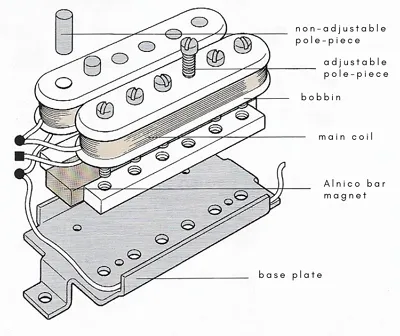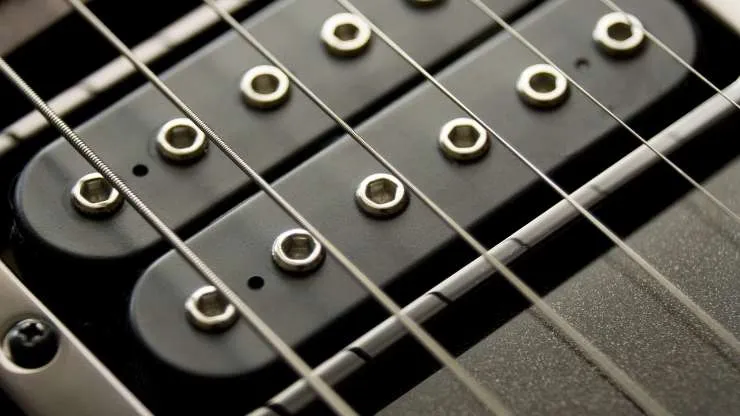What Are Humbuckers?
Invented in the mid-20th century by Seth Lover while he was working for Gibson, humbuckers have become synonymous with blues, jazz, and rock music. They’re essentially two single-coil pickups combined, working in reverse polarity and reverse winding to drastically reduce unwanted noise - or, in other words, to buck the hum!
The two coils are wired in series, which doubles the output voltage-a feature not found in single-coil designs. This increased output results in a stronger signal, enabling humbuckers to drive an amplifier into saturation more efficiently, which is particularly helpful in genres such as rock and metal. The design of humbuckers also leads to a cancellation of the high frequencies that single coils produce, leading to a darker, warmer tone that’s ideal for many styles of music. The tonal characteristics of humbuckers can also be manipulated by adjusting the distance between the strings and the pickups or by using different types of magnet materials.
Humbuckers have evolved significantly over time, with manufacturers creating variations in design and tonal characteristics to offer musicians a broad spectrum of options.
Anatomy of a Humbucker

A typical humbucker consists of a few essential components: two coils of wire, a pair of magnets, adjustable pole pieces, and a metal base plate. Wound around a bobbin, the coils are the heart of the pickup, where the electricity is generated. The number of windings around these coils significantly influences the pickup’s tone and output.
The magnets, often made of alnico or ceramic, create a magnetic field, which is necessary to induce a current in the coils when the guitar strings vibrate. Pole pieces are adjustable for each string and form a path for the magnetic field, allowing players to fine-tune the humbucker’s response to individual strings. Finally, the base plate, usually made of metal, provides a foundation for the other components and helps shape the overall magnetic field.
Understanding the role of each component can help guide players in their quest for the perfect tone, as different materials and configurations can drastically alter a pickup’s sound.
What’s the Main Difference Between Humbuckers and Single-Coil Pickups?
Comparing humbuckers and single-coil pickups offers a fascinating insight into the mechanics of sound production. Single-coil designs are renowned for their crisp, bright tonal quality and are a staple in genres such as country, blues, and surf rock. However, they fall prey to electromagnetic interference, which results in an unwanted hum or buzz.
With their dual-coil design, humbuckers effectively nullify this hum, producing a smoother, cleaner sound. Due to their high output and warmer tones, humbuckers are favoured in heavier music genres, although their versatility shouldn’t be understated.
The choice between these two types of pickups primarily depends on your desired tone and genre. It’s an individual preference, like choosing between a sundrenched beach or a snow-covered mountaintop. Both have unique charms and cater to different tastes; while single-coils offer rawness and twang, humbuckers offer punch and power.
How Different do They Sound From Single-Coils?
Many guitarists favour humbuckers for their rich, full, and resonant sound, starkly contrasting the bright and crisp output of single-coil pickups. They typically yield a thick, warm tone with enhanced lower mids and softer high frequencies. The robust and heavy tone of humbuckers is particularly popular with guitarists playing genres that require depth and power, like rock, metal, and jazz. The balance of bass and treble frequencies creates a round, fat sound that fills a mix, making humbuckers the pickup of choice for rhythm guitarists.
The hum-cancellation technology of humbuckers also ensures a cleaner and quieter performance, which is especially beneficial in high-gain situations where unwanted noise would otherwise be amplified. This, combined with their ability to deliver a punchy, powerful output, makes humbuckers a staple in guitar amplification technology. However, humbuckers aren’t limited to these genres; their versatility allows guitarists across different genres to experiment and create their unique sounds.
Different Types of Humbuckers and Their Benefits
Standard humbuckers, P-90s, and mini-humbuckers are three of the most common types of humbucker, and each has unique characteristics.
- Standard humbuckers, often seen on Gibson guitars, provide a deep, warm, and thick tone - ideal for heavy rock.
- P-90s, on the other hand, offer a tone that is somewhere between a single-coil and a humbucker. They have a rich mid-range, providing a distinct tone that works well for rock, blues, and jazz genres.
- Mini-humbuckers are smaller than standard humbuckers and deliver a brighter and more focused sound, making them suitable for a wide range of music genres.
The benefits of these humbuckers are not only restricted to their unique tonal qualities but also extend to their ability to cancel hum, versatility, and adaptability to different musical styles. However, like when choosing between humbuckers and single-coils, the choice of which type of humbucker will ultimately depend on your tonal preferences.
Finding the Right Humbucker for Your Guitar
Choosing the right humbucker for your guitar is akin to a culinary journey, where the quest for the perfect blend of spices parallels the search for the ideal balance of tones. Multiple factors can influence your choice, including the kind of music you play, the guitar you use and your personal tone preferences.
If you’re a heavy metal shredder, then you might want to opt for some hot, high-output humbuckers genres. Alternatively, a thicker-sounding moderate-output humbucker could be better if you’re into jazz or blues music.
While tonewood plays less of a role in electric guitars than in acoustic instruments, it’s still worth considering the influence your guitar wood can have. For instance, brighter woods like maple can pair well with warm-sounding humbuckers, while darker woods like mahogany may benefit from a humbucker that offers a bit more treble.
Pros and Cons of Humbucker Pickups
Like any piece of technology, humbucker pickups come with their own set of advantages and drawbacks. On the positive side, humbuckers are known for their rich, warm tones and ability to cancel out ambient noise, resulting in a clean, undistorted sound. This makes them ideal for musicians performing in venues where electrical interference can be problematic. They also offer greater output, making them excellent for genres that require robust and punchy sound. However, this strength can also be a drawback.
Humbuckers can sometimes over-emphasise the mid-range frequencies, which might not be suitable for genres requiring a well-balanced and transparent sound. Furthermore, they’re typically larger than single-coil pickups and may not fit all guitar designs.
Tips for Installing and Maintaining Humbuckers
Installing and maintaining humbuckers requires precision and care. When installing a humbucker, ensure you’ve chosen the correct sized pickup for your guitar cavity. A tightly fitting humbucker allows for optimal sound transmission. After installation, regularly cleaning your humbucker can prolong its life and maintain its audio quality. Gently remove surface dust and grime using a soft cloth, avoiding the use of harsh chemicals that could damage the wiring.
If you encounter any sound issues, such as a sudden drop in output or an unusual noise, it’s recommended to consult a professional to avoid accidental damage. Remember that longevity and peak performance depend primarily on regular maintenance and careful handling. Moreover, any modifications you make, even a minor one, can significantly affect sound output. While experimentation is a great (perhaps essential) way to find your sound, you should always approach it with a clear understanding of the potential impact on your equipment. Like any other pickup, the humbucker is the heart of your electric guitar’s sound - so treat it with the care it deserves!
Find Your Guitar
If you’re looking for a rich, full-bodied tone or need to eliminate hum, humbuckers could be exactly what you’re looking for. Thankfully, as one of the most popular pickup choices, there are plenty of guitars with humbuckers to choose from! Head over to our Finder tool, enter your search parameters, and start the search for your perfect guitar.

